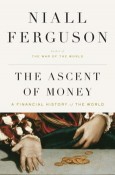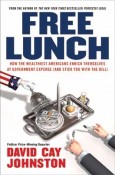Q&A: NIALL FERGUSON, Columnist and Author
Written on January 29th, 2009 |
Aired 01/27/09
NIALL FERGUSON is Lawrence A. Tisch Professor of History at Harvard University, a Senior Research Fellow at Jesus College, Oxford, a Senior Fellow of the Hoover Institution at Stanford, an op ed columnist for the LA Times, and the other of several books, the newest is THE ASCENT OF MONEY: A Financial History of the World.
In THE ASCENT OF MONEY, NIALL FERGUSON says that finance is the foundation of human progress, and that financial history is the essential back-story behind all history.
He explains how banks provided the material basis for the the Italian Renaissance, while the bond market was the decisive factor in conflicts from the Seven Years' War to the American Civil War. Ferguson points out the origins of the French Revolution in a stock market bubble, and shows how a financial revolution is propelling the world's most populous country from poverty to power in a single generation.
The single most important lesson of financial history is that sooner or later every bubble bursts - sooner or later the bearish sellers outnumber the bullish buyers - sooner or later greed flips into fear.
We'll discuss how history can be helpful at a moment like this. And, what can it tell us about our current crisis and the way out?
Q&A: DAVID CAY JOHNSTON – Pulitzer Prize Journalist / Author
Written on January 22nd, 2009 |
Aired 01/20/09
DAVID CAY JOHNSTON, who won a Pulitzer Prize for his innovative coverage of our tax system, retired this year as a investigative reporter for The New York Times. He is the author of PERFECTLY LEGAL: The Covert Campaign to Rig Our Tax System to Benefit the Super Rich--and Cheat Everybody Else and FREE LUNCH: How The Wealthiest Americans Enrich Themselves at Government Expenses (and Stick You with the Bill).
DAVID CAY JOHNSTON knows about money, finances, and the economy. More than anything else, he knows about taxes. We'll talk about how we can make the most of the opportunity presented by our current financial catastrophe. Do the bailouts make sense? What could we do that would be smarter, more efficient, more effective - that might work?
Q&A: GERALD CELENTE – The Trends Research Institute
Written on January 12th, 2009
Aired 01/06/09
GERALD CELENTE of The Trends Research Institute publishes TRENDS JOURNAL. A New Yorker, who calls himself a political agnostic, Celente gives everybody hell. I first booked him in January 05 and listener response has led me to make this an annual show.
CELENTE accurately forecast the Iraqi War quagmire, the last two recessions, the Dot-Com meltdown, and the 1987 world stock market crash. As far back as 1993 he predicted that a new Crusades would be raging at the dawn of the new millennium.
Excerpt from TOP TRENDS OF 2009 by Trends Research
THE YEAR THAT WAS
We described last year's "Year that Was" as ending with "an economic bang and a political thud." By contrast, 2008 goes out with a spectacular display of political fireworks and an economic implosion unlike anything experienced before.
History was made. The racial barrier came down. A man of black & white blood, modest means and scant experience was elected to rescue a great and foundering nation. A young, charismatic president was replacing a Commander in Chief who had long since worn out his welcome.
In 2000, George W. Bush assumed the presidency following an election replete with doubt and irregularities. A troubled first year abruptly gave way to a 90 percent approval rating following the trauma of 9/11. Playing his Commander in Chief trump card, he declared a War on Terror and war on Iraq.
In 2004, with the Iraq War going badly but the economy booming - especially the real estate market - he remained popular enough to squeak out a second term. In 2006, with the costs of war and casualties mounting, a Democratic Congress was voted in with a mandate to end the Iraq War. Instead they kept funding it.
By 2007, with America still bogged down in war, the real estate bubble bursting, a credit crisis erupting, and the subprime lending market collapsing, George Bush's popularity went into free fall. No longer confined to disgruntled Democrats, Bush-bashing became a bipartisan pastime.
Most will remember the economy as the 2008 Election hot button issue. In reality, it replaced the Iraq War only when the news of failing banks, bustedbrokerages, government bailouts and rescue plans preoccupied the press.
But it was candidate Barack Obama's early stand against the Iraq War - and his promise to end it - that separated him from the favorites of both parties seeking the presidency. In early 2008, none of the candidates in the run for the White House had an approval rating above 50 percent. Going into the Iowa Primary, Hillary Clinton was leading in the national polls while Obama's campaign was slowly gaining momentum. It wasn't until talk show host Oprah Winfrey jumped into the ring that it kicked into high gear.
THE PRESIDENTIAL REALITY SHOW
With the undisputed Queen of TV in his corner, the Obama campaign suddenly transformed into a flawlessly packaged Oprah production. Whether a stadium spectacle or a small town meeting, every event was staged to perfection.Was the celebrity witchcraft that endears Oprah to her millions of fans directed toward political stagecraft?
As if by magic, Obama, an adequate public speaker, became the master of the Teleprompter; so skillful - and with cameras so artfully placed - that the illusion of spontaneity was created. Pacing the stage, confident of his words, his cadenced oratory gave him a messianic quality. "Yes we can!" preached Obama. "Yes we can!" echoed his mesmerized political congregation.
As the economy worsened and the Iraq War was pushed into the background, Obama's focused message of change and his tightly-scripted performance made him a leading contender in The Presidential Reality Show.
Meanwhile, his main challenger, Hillary Clinton was repeatedly discrediting herself by playing the race card, and clumsily exaggerating her foreign policy
achievements with such claims as having dodged bullets in Bosnia and negotiating the peace in Ireland.
In opposition, the Republicans ran the uncharismatic and aging John McCain, inextricably tied to eight years of the Bush administration, an insurmountable obstacle. The President, posting near record low approval ratings, was so universally derided and despised that McCain saw Bush as an unconditional liability, banning him from the campaign trail.
The combination of an economic meltdown, Mc- Cain's acknowledged lack of economic awareness ... and puzzling choice of running mate made possible the impossible: a black, practically unknown challenger swept into power.
